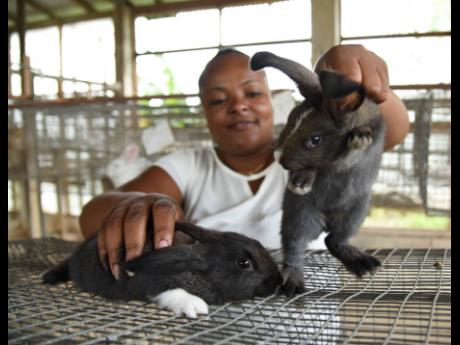Rearing rabbit, the other white meat
The Jamaica 4-H Clubs is on a drive to get Jamaicans to consume more rabbit, which it is actively promoting as ‘the other white meat’ and a healthful alternative for persons looking to enhance their diet.
With less than one per cent body fat, rabbit is much leaner and higher in protein when compared to other meats. It is also just as nutritious as fish and higher in protein than many cuts of beef and very tasty, according to regional branch manager for the 4-H Clubs, Sharlene Edwards.
During a visit to the 12-acre Rosehall 4-H Centre at Rosehall in Linstead, St Catherine, on Wednesday, the Gleaner team got a crash course on rabbit rearing and learnt about plans by the organisation to make rabbit meat easily available and affordable to Jamaicans in the hope that it will become a staple in most homes. The 4-H Clubs is also looking to resuscitate the Jamaica Rabbit Breeders Association.
Among the rabbits on display were Flemish Giants and New Zealand Red, White, and Black, which have dominated local breeding over many years. Centre Manager Sharolyn Johnson explained that the 4-H Clubs is looking to replace the current breed with the American Blue strain, which is growing in popularity among local breeders. With a mature male weighing between nine and 11 pounds and a female between 10 and12 pounds on average, this breed is ideal for its meat potential.
The Jamaica 4-H Clubs has a 400-rabbit-capacity facility but was down to little more than 100 animals when we visited, based on the planned changeover. Edwards explained that rabbit rearing across Jamaica was ad hoc, and so they were unable to provide accurate data on breeding and production. She noted that the strictures on food imports caused by COVID-19 made a strong case for a full-fledged national rabbit-breeding programme. She explained that given its relatively low infrastructure and feed input costs, the programme, if successful, could significantly enhance Jamaica’s food security and nutrition status.
When the COVID-19 pandemic is over, the Jamaica 4-H Clubs plans to acquire some American Blues from farmers in St Elizabeth and build up its breeding stock before launching a major ‘Eat Rabbit’ campaign, according to Edwards.
Easily managed
Rabbits, which are mature for breeding at six months, have a gestation period of 28 to 30 days and are easily managed, and their grain feed can be supplemented with a wide range of local grasses and forage, but the regional manager stressed the importance of accurate record-keeping as an integral management practice. This is to ensure that inbreeding does not take place, as well as to identify standout performers.
Does will drop litters of between two and 10 kittens, and with a breeding cycle of about three months, or four cycles for a year, a mother rabbit can easily deliver a good return on investment.
Care, however, should be taken to ensure that the accommodations, which can be quite affordable, are properly established before the first pair of rabbits is acquired, Johnson emphasised.
“Success in breeding depends on the quality of and location of the hutches and facilities,” with water and ventilation very important factors, she disclosed.
It is important to remember that rabbits have teeth like rodents and chew all the time and are likely to nibble on wooden parts of their hutches. Painted wood is not an option since it could prove toxic.
To learn more about the Jamaica 4-H Clubs’ effort to promote rabbit as the other white meat, please contact the Rosehall 4-H Centre by calling 876-985-2959 or the head office at 876-927-4050-2; check out their website at www.jamaica4hclubs.com; or reach them via Facebook, Twitter, or Instagram.

